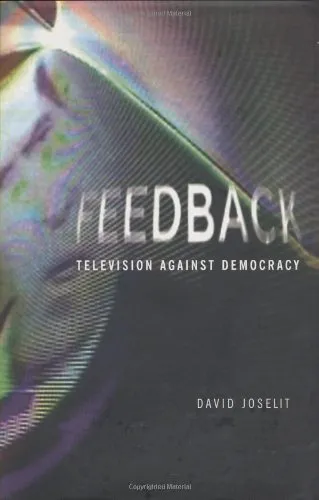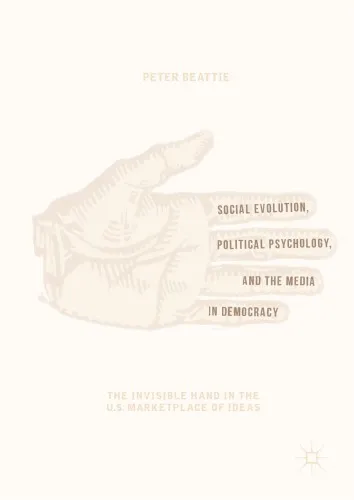Feedback: Television against Democracy
4.0
Reviews from our users

You Can Ask your questions from this book's AI after Login
Each download or ask from book AI costs 2 points. To earn more free points, please visit the Points Guide Page and complete some valuable actions.Related Refrences:
Introduction to 'Feedback: Television against Democracy'
Written by David Joselit, Feedback: Television against Democracy offers a deep, provocative examination of the intersection between mass media, particularly television, and the structures of political power. Joselit artfully explores how television as a medium has reshaped perceptions of democracy, argumentation, and civic participation, arguing that its inherent mechanisms often work against the core principles of democracy itself. The book pulls apart the cultural, aesthetic, and technological aspects of television to uncover how they align—or clash—with the democratic ideals of equality, collective decision-making, and open discourse.
In this critically acclaimed work, Joselit reflects on television's transformational role in modern society, examining its history and impact on democratic processes. By conceptualizing television as a series of feedback loops that foster immediacy, repetition, and uniformity, he raises urgent questions about its influence on information flow, voter behavior, and the larger public sphere. This book matters not just for students of politics or media studies but for anyone seeking to understand the evolving relationship between communication technologies and the democratic fabric of society.
A Detailed Summary of the Book
At its core, Feedback: Television against Democracy investigates the ways television networks communication and power, fundamentally altering how democracy operates. Joselit identifies television's essential features: its visual immediacy, its reliance on repetitive patterns, and its ability to blur lines between private and public life. He critiques this medium’s tendency to reduce civic engagement to passive consumption, offering sharp insights into how political systems increasingly depend on televised spectacle over substantive debate.
Throughout the book, Joselit examines how television mediates between citizens and government through cycles of feedback. This feedback doesn’t engage viewers in meaningful discourse; instead, it reinforces pre-existing biases and preferences. He argues that the logic of television undermines democratic deliberation and dialogue by prioritizing sensationalism, brevity, and emotional appeal. By the end of the book, Joselit presents television as an anti-democratic force that favors corporate agendas and concentrated power over collective decision-making.
Key Takeaways
- Television operates as a feedback loop that shapes public opinion through repetition, spectacle, and emotional triggers.
- The medium favors simplistic narratives over complex discussions, undermining deliberative democracy.
- Television’s visual and temporal structures promote immediacy and surface-level engagement over critical thinking.
- The commercialization of television content prioritizes profits over serving public interest or fostering civic engagement.
- Mass media, by its very infrastructure, amplifies voices of power while marginalizing minority viewpoints, solidifying existing hierarchies.
Famous Quotes from the Book
“Television is a medium of immediacy, but that immediacy comes at the cost of complexity. In democracy, complexity is not just inevitable—it is necessary.”
“To watch television is to be lulled into participation without action, engagement without agency.”
“Democracy dies not in darkness, but in the glare of over-simplified spectacle.”
Why This Book Matters
In today’s media-saturated world, the questions raised by David Joselit’s groundbreaking book have only grown more relevant. While the book primarily focuses on television, its arguments extend to today’s media ecosystems, including social media and streaming platforms, which function as newer forms of feedback loops. Joselit’s critique serves as a powerful reminder of the dangers posed by dominating communication frameworks that prioritize entertainment, emotional appeals, and corporate interests over informed deliberation and equitable representation.
Joselit challenges us to rethink how media shapes democracy, encouraging readers to remain vigilant about the forces that influence their information consumption. This book is not just a critique but a call for creating alternative ways of cultivating democratic media that embraces complexity, divergence, and genuine public participation. For politicians, academics, journalists, and everyday citizens, Feedback: Television against Democracy offers invaluable insights into the perilous paths democracy may take when mediated by profit-driven, visual-heavy technologies.
In short, Joselit’s work invites readers to engage with media critically and to imagine new possibilities for democratic life in the 21st century.
Free Direct Download
You Can Download this book after Login
Accessing books through legal platforms and public libraries not only supports the rights of authors and publishers but also contributes to the sustainability of reading culture. Before downloading, please take a moment to consider these options.
Find this book on other platforms:
WorldCat helps you find books in libraries worldwide.
See ratings, reviews, and discussions on Goodreads.
Find and buy rare or used books on AbeBooks.
1190
بازدید4.0
امتیاز50
نظر98%
رضایتReviews:
4.0
Based on 0 users review
"کیفیت چاپ عالی بود، خیلی راضیام"
Questions & Answers
Ask questions about this book or help others by answering
No questions yet. Be the first to ask!



